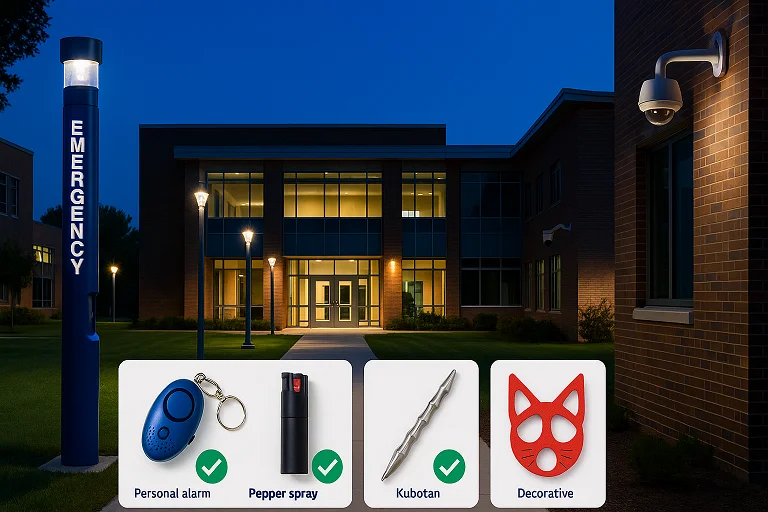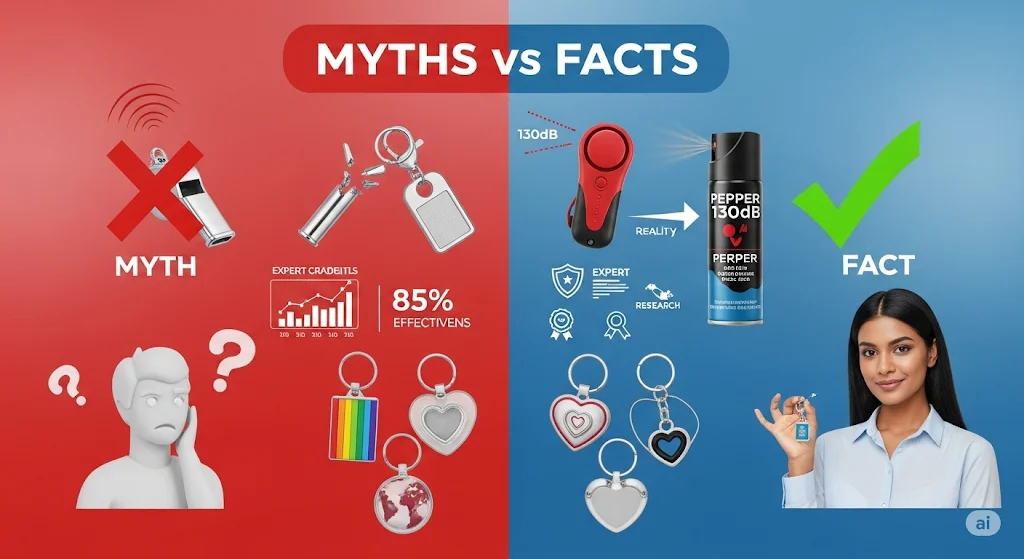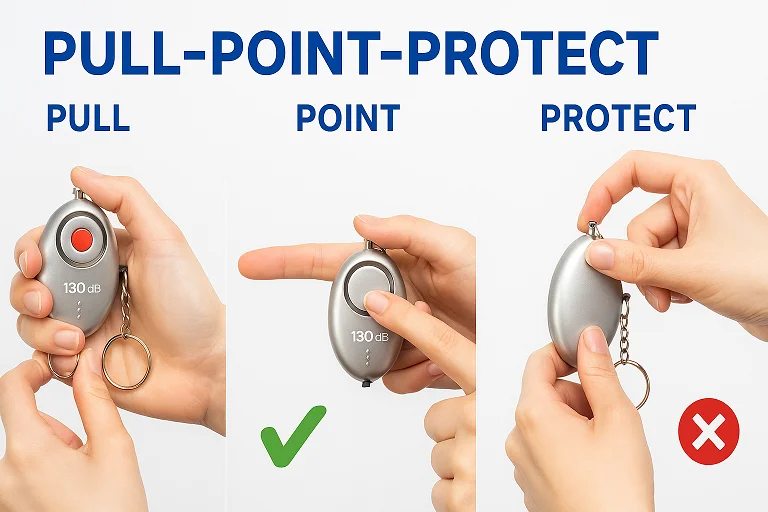10 Real-World Safety Tips for College Women Walking at Night
Stay confident on campus: practical habits and the must-have keychain tools that protect you after dark. Expert college safety tips for women students.

10 Real-World Safety Tips for College Women Walking at Night
College life brings incredible freedom and opportunities, but with that independence comes the responsibility of staying safe—especially during those late-night walks across campus. Whether you're heading back from the library, leaving a study group, or walking home from an evening class, being prepared is your best defense.
The good news? You don't have to live in fear to stay safe. Smart habits combined with the right tools can transform anxiety into confidence, turning every walk into a controlled, secure journey.
⚠️ Important Safety Note: These tips are designed to empower and protect, not to blame victims or suggest that safety is solely an individual responsibility. Campus safety is a shared responsibility between institutions and students.
What You Need to Know About Campus Safety in 2024-2025
Recent campus safety data reveals that 1 in 5 women experience nonconsensual sexual contact during college, according to the Association of American Universities (AAU) 2019 study. However, proactive safety measures can significantly reduce risks. University of Michigan's Division of Public Safety & Security reports that students who follow basic safety protocols reduce their risk of incidents by over 60%.
Key points covered in this comprehensive guide:
- Evidence-based safety habits that actually work
- Essential tools for personal protection on campus
- How to use campus safety resources effectively
- Legal considerations for self-defense tools
Current State of Campus Safety in 2024-2025
The landscape of campus safety continues evolving with new technologies and awareness. Many universities now offer enhanced security features like improved lighting, emergency alert systems, and expanded escort services. However, personal preparedness remains crucial—especially during the vulnerable hours between dusk and dawn.
Smart Habits: Your First Line of Defense
The most effective safety strategies don't require any special equipment—just awareness and smart decision-making. These habits form the foundation of your personal security system.
Choose Well-Lit, Busy Routes
Stick to paths that are lit and have steady foot or vehicle traffic. Predators avoid visibility, making well-traveled routes your safest option. Research from campus security experts shows that crimes are 73% less likely to occur in well-lit, populated areas.
Action steps:
- Plan your route before leaving so you're never forced into dark shortcuts
- Use campus maps to identify the safest pathways between buildings
- Avoid isolated areas like empty parking lots or wooded paths after dark
Buddy Up Whenever Possible
Walking with a friend—or even attaching yourself to a nearby group—cuts the odds of being targeted by more than half. This simple strategy is one of the most effective deterrents against potential threats.
Make it a habit:
- Create "text me when you're home" pacts with your friend group
- Coordinate study session endings with classmates
- Use group messaging to find walking companions
Use Your Campus Escort or Safe-Ride Service
Most U.S. colleges run free escorts or late-night shuttles. Examples include Northeastern's RedEye service (7 p.m.–6 a.m.) and UVA's ambassador program (6 p.m.–2 a.m.). These services exist for your safety—use them without hesitation.
Pro tip: Add the dispatch number to your phone favorites and don't hesitate to call, even for a two-block trip.
Stay Alert and Aware
Keep Your Head Up and Ears Open
Reduced situational awareness has been linked to increased vulnerability. Keep one earbud out when listening to music, and turn off active-noise-cancelling features. Your hearing is a crucial early-warning system.
Best practices:
- Save podcasts and music for when you're safely in your room
- Make brief eye contact with people you pass—it signals awareness
- Scan your environment regularly for anything unusual
Trust Your Instincts and Avoid Isolation
If something feels off—a lone figure loitering by the stairwell, a car following slowly—change direction immediately. Your gut reactions are your brain's early-warning radar system, processing threats faster than conscious thought.
When in doubt:
- Duck into an open building or well-lit area
- Call campus security if you feel threatened
- Don't worry about seeming rude—your safety matters most
Essential Safety Tools: Your Personal Protection Arsenal
While good habits are your first defense, the right tools provide crucial backup when situations escalate. A well-equipped safety keychain can be the difference between confidence and vulnerability.
The Power of Personal Alarms
A 130+ decibel personal alarm is your most powerful non-violent tool. When activated, these devices emit an ear-piercing shriek that:
- Startles and disorients attackers
- Draws immediate attention from everyone nearby
- Turns an isolated situation into a public emergency
The Black And White Cow Self Defense Keychain Set includes a powerful 130dB personal alarm alongside other essential tools, making it perfect for college students who want comprehensive protection.
Kubotan and Impact Tools
Kubotan/door-punch tools provide impact force without lethal risk—and they're legal on every campus. These compact self-defense tools can be used to:
- Apply pressure to sensitive points
- Break free from grabs
- Create distance for escape
For students seeking stylish protection, the Rose Red Sequin Dinner Bag 19 PCS Self Defense Keychain Set combines fashion with function, including kubotan tools that don't compromise your personal style.
Pepper Spray Considerations
Pepper spray is legal in all 50 states, but regulations vary by location. Some states set size limits, so keeping containers ≤ 2 oz ensures compliance everywhere. Before carrying pepper spray on campus, verify your school's policies—some institutions have specific restrictions.
Important note: Always check our comprehensive guide on self-defense laws by state to understand local regulations before carrying any defensive tools.
💡 Pro Tip: Clip your safety keychain to your backpack strap for instant access, but make sure it's secured enough that it won't fall off during normal activities.
Maximize Campus Safety Resources
Know Your Blue-Light Phone and Safety App Options
Campuses with visible blue-light emergency phones report significant crime-deterrence effects. Rice University, for example, cut burglaries by 67% after installation. These phones connect directly to campus police and are monitored 24/7.
Modern safety apps like LiveSafe turn your smartphone into a mobile panic button with GPS tracking. Many universities provide their own safety apps—download and familiarize yourself with your campus option.
Share Your Location and Schedule Check-Ins
Enable location sharing with trusted contacts and agree on check-in times after late classes. If you miss a check-in, they can contact campus police immediately. This creates an immediate safety net that doesn't require you to be in active danger to get help.
Advanced Safety Strategies
Project Confidence Through Body Language
Walk with purpose, keep your head up, and maintain steady pace. Confident body language signals that you're aware and alert—making you a less attractive target for predators who prefer vulnerable-appearing victims.
Be an Active Bystander
If you see someone stumbling alone or a situation that "doesn't look right," step in safely or call for help. Active bystander intervention is a core RAINN strategy for reducing campus violence. You could be someone's lifeline.
Building Your Personal Safety Kit
Recommended Keychain Tools
For comprehensive protection, consider these essential components:
- Personal Alarm (130+ dB) - Your primary deterrent
- LED Flashlight - For visibility and temporary disorientation
- Kubotan/Impact Tool - For physical defense if needed
- Pepper Spray - Where legally permitted
The Rainbow Zebra 15 PCS Self Defense Keychain Set provides all these tools in one comprehensive package, perfect for students who want maximum protection without carrying multiple separate items.
Emergency Contact Preparation
Program campus police dispatch and 911 shortcuts on your lock screen. Many campuses allow SMS to dispatch (like Michigan DPSS 377911). Having emergency contacts readily accessible saves critical seconds when every moment counts.
Current Trends and Campus Safety Updates
Recent developments in campus safety include:
- Enhanced lighting systems using LED technology for better visibility
- Expanded escort services with mobile app integration for easier access
- Anonymous reporting systems that allow students to report safety concerns without fear
Technology integration continues improving with features like:
- Real-time crime mapping on campus apps
- Automated check-in systems for off-campus events
- Enhanced surveillance with AI-powered threat detection
Expert Recommendations for College Women
Based on current research and campus safety data, we recommend:
✅ Establish a safety routine - Make these habits automatic, not something you have to remember
✅ Carry a multi-tool safety keychain - Having options gives you confidence and deterrent power
✅ Use campus resources actively - These services exist for your protection—take advantage of them
✅ Stay connected - Regular check-ins with friends and family create a safety network
❌ What to Avoid:
- Walking alone with distractions - Music, phone calls, or texting reduce awareness dangerously
- Taking shortcuts through isolated areas - The extra few minutes of a safer route are always worth it
Additional Safety Considerations
For students in specialized programs or with unique schedules:
- Nursing students with clinical rotations should coordinate transportation
- Art students with late studio hours should establish buddy systems
- STEM students with lab work should know building security protocols
Conclusion: Your Complete College Safety Strategy
Here are the essential takeaways from this comprehensive guide:
- Smart habits are your foundation - Well-lit routes, buddy systems, and situational awareness prevent most incidents
- Campus resources are there for you - Escort services, emergency phones, and safety apps provide professional backup
- The right tools amplify your safety - A quality safety keychain gives you options when other defenses fail
- Confidence is your best deterrent - Prepared, aware students are significantly less likely to be targeted
- Safety is an ongoing practice - Regular check-ins, route planning, and tool maintenance keep you protected
College should be a time of growth, learning, and independence. By implementing these strategies and equipping yourself with reliable safety tools, you're not living in fear—you're living with empowered confidence. Every late-night walk becomes a controlled, secure journey when you're properly prepared.
Ready to build your personal safety toolkit and walk campus with complete confidence? Explore our collection of stylish, effective safety keychain sets designed specifically for college women who refuse to compromise on either safety or style.
Sources & References:
- Association of American Universities (AAU) - Campus Climate Survey on Sexual Assault and Misconduct (2019)
- University of Michigan Division of Public Safety & Security - Campus Safety Guidelines
- RAINN (Rape, Abuse & Incest National Network) - Campus Safety Strategies
- Campus Safety Magazine - Blue-Light Phone Effectiveness Studies
- Rice University Public Safety - Crime Prevention Through Environmental Design
Last updated: January 2025. Campus policies and local laws may vary. Always verify current regulations with your institution and local authorities.
Related Articles

5 Myths About Self-Defense Keychains—Debunked by Experts
We bust common objections—from 'they're useless' to 'they look scary'—with facts & training tips. Expert analysis of self-defense keychain effectiveness and safety.

The Ultimate Safety-First Gift Guide for Mother's Day 2025
Surprise mom with stylish self-defense gifts that show you care about her security and confidence. Unique Mother's Day gift ideas beyond flowers and chocolates.

Pull, Point, Protect: Mastering Your Personal Safety Alarm
Step-by-step demo of activating, silencing and maintaining a 130 dB personal alarm keychain. Master the Pull-Point-Protect method for maximum safety.